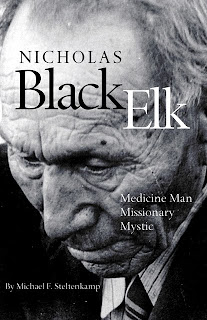 Michael Steltenkamp's second book recently received a bad review in the American Library Association's Choice Magazine.
Michael Steltenkamp's second book recently received a bad review in the American Library Association's Choice Magazine.Nicholas Black Elk: Medicine Man, Missionary, Mystic was panned by Colgate University's C.T. Vecsey as having much of the same content as his earlier book Black Elk. Furthermore, Vecsey questions Steltenkamp's objectivity, while appearing to side with authors like the poet, John Neihardt, who strike me as being quite subjective.
(In addition to being a Roman Catholic priest, Seltenkamp also has a PhD in anthropology.)
Vecsey criticized Steltenkamp for basing all of his research on his interaction with Lucy Looks Twice. I have to question this. As I see it, Steltenkamp carefully read Neihardt's book and was right to ask why the poet glossed over the last 40-50 years of Nicholas Black Elk's life.
If the review of Steltenkamp's current book was online I'd give you a link to it. However, I can give you a link to a site that looks at Black Elk in a way that is closer to how I tend to look at him. I especially encourage you to scroll down to the botton of the link and read the section under the heading
WHY IS BLACK ELK SO CONTROVERSIAL?
The person responsible for that site is Sam Wellman. Black Elk is one of his "Heroes of History," and I'm somewhat amused that the heroes he tends to focus on are "explorers," and "missionaries." These, as you may know, are two of the most-bashed occupations amongst historians.
